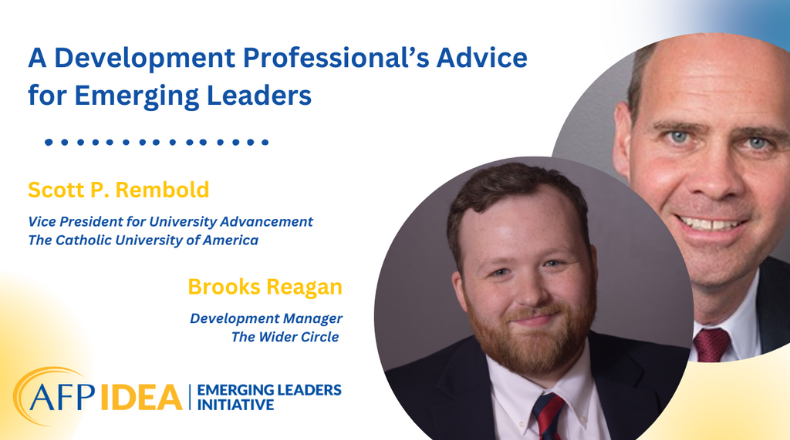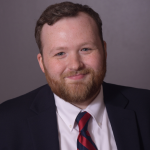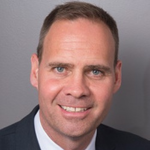A Development Professional’s Advice for Emerging Leaders

“Our work is not about us. It is about the service we provide to others.”
Brooks Reagan, a member of AFP’s Emerging Leaders Committee, sat down with Scott Rembold, vice president for university advancement at The Catholic University of America, to discuss Scott’s years of experience as a development professional, his advice for today’s emerging leaders, and the success of his most recent “Light the Way” campaign at CUA.
Q: Reflecting on your most recent major campaign, which surpassed a record-level $500 million dollars, could you share three valuable insights gleaned over the course of the campaign, highlighting those critical decisions that resulted in overall success, earning Catholic University a place in fundraising history?
A: This was Catholic University’s first comprehensive campaign, so the first decision that set us up for success was the president and our board of trustees choosing to allocate the funding to support the campaign and build out the advancement office. When we started, we had a staff of 28. When we ended, we had more than 80 on the advancement team, deploying school-based teams across the campus. This strategy brought the faculty and staff into prospecting and donor development work and enabled them to be more externally focused, which in turn helped with their engagement in enrollment.
Having the resources in hand, coupled with our strategic plan, the second decision we made was changing our volunteer engagement model. This started with our board of trustees that previously had a prescribed number of religious and lay members. We overhauled the bylaws, making more room for lay participation and elevating the contribution requirements. By changing the structure of the board and its composition, it paved the way to fully implement the creation of boards of visitors, to be stationed at each school. During Light the Way we created 10 new boards of visitors for our schools and institutes and the athletics program.
Taking the time to be thoughtful about hiring the right people for the right jobs is the third insight. It is not only about finding a person who has the background and skill set but also about finding someone whose values, drive, and work ethic are aligned with ours. Ultimately, we must make sure that each team member is highly collaborative and responsive to their colleagues and goes the last mile for our constituents. We must hire well to ensure we deliver a superlative level of customer service. As the campaign lifted the university’s and advancement office’s reputation, we attracted a higher caliber applicant and hiring the right people became easier.
Q: As Catholic University embarks on a new campaign and sets new fundraising goals; can you share your thoughts on how institutions may effectively adapt to an ever-changing landscape to foster engagement and continue to grow the donor base?
A: Looking back on our recently completed Light the Way (LTW) campaign, we found that while the impact was robust, it was not evenly felt across the university. Now, we are working to make sure that we are fully engaging colleague partners across the campus through messaging about the effects of LTW, training, and relationship development. This effort is supported by our strategic planning and campus planning initiatives that will communicate the goals for the next 10 years. Our president has already set an overarching goal to double our student population (to exceed 10,000 students) in total within the next decade.
In developing our next campaign, we must engage many more constituents and double our major and principal gift prospect pools. This means we must do a better job of educating our students about the value of staying connected, and educating alumni about how they can become involved. These efforts will be offered online, but also through in-person opportunities.
The pandemic gave us all a new way to do business and build out new skill sets. We learned how to build communities online and that convening people in person is not our only outreach method. We found folks were looking for that type of virtual engagement, and there was a significant level of interest in intellectual content. The issue before us is how do we publicize and make campus events accessible online. One method that has been successful so far is our online salons. A professor or administrator will lead with a brief presentation on a subject and then facilitate a deep dive discussion with roughly 20 people. By providing opportunities for everyone to access, we can meet people where they are.
Q: Based on your vast experience and wealth of knowledge gathered over a successful career in development, can you share some insights on valuable resources that can provide essential building-blocks to those who are less experienced in development, wishing to expand their knowledge base.
A: Thinking over the landscape, what sticks out the most to me is how many more online training resources are available today. There are also more in-person training opportunities. I would recommend researching online and in-person presenters to be sure you are signing up for a quality experience!
Certifications can also serve as a great educational tool and what is fascinating to me is not only the certifications but also the programs now being offered (both online and in person). What comes to mind is the Lilly Family School of Philanthropy at Indiana University. The dean there shared that there are roughly 25 professionals working through a Ph. D. program in philanthropy. While there have been nonprofit management programs as well as higher education administration degrees for many years, now there is a terminal degree specifically for fundraisers. This elevates our profession in the academy, which is a very good thing.
As fundraisers, we are generalists representing the various parts of the institutions that we work for. It’s important to take the time to learn how the various departments in your organization work. It’s important to understand how our colleagues’ work influences our own. Connect with folks like your CFO, endowment manager, student affairs, enrollment, and have those parties come to talk to your advancement colleagues about their work, current issues, and the universities position on these issues, so you can be an informed and effective representative.
I always recommend reading both the Chronicle of Higher Education and the Chronicle of Philanthropy as one always needs to be ready to join the conversation on current issues and be as informed as possible. Reading these resources helps people answer questions associated with higher education like “Is it worth the money?” and “What is the university doing to combat declining student demographics and enrollment?” Being thoughtful and well informed on the issues and the university or organization you represent will make you better equipped to make a connection with others that will lead to their continued engagement. The quickest way to turn someone off, especially when connecting with prospects, is to not be able to answer their questions or meaningfully engage. We have to earn the next visit.
Q: Where did you look for mentors in your career path? Can you share the most important lessons you learned from mentors?
A: I focused first on the metrics, in choosing who to look to for mentorship. And I asked the leaders of our development team to identify who they thought were their best fundraisers and why, so I could understand each person’s strengths and what enabled them to succeed. I would ask to connect for lunch with them to learn about their approaches, techniques, and strategies they employed for long-term success. At several of the universities where I worked, they assigned mentors to new employees.
The best lesson I learned from a mentor was to do your homework. I learned as much as I could about a prospect so I could understand their journey, their interests, and I would connect with academicians and alumni in the same field to learn more about the prospect’s work. How did a person in that field make their money? What triggers liquidity and tax exposure? Understanding their circumstances helped me to ask the right questions, and advance giving conversations sooner.
Q: Approaching fundraising on a macro level, are there efforts being undertaken in your approach to your more recent graduates versus the traditional methods of years past?
A: Admittedly, we are just now getting to that at Catholic University. Right now, we are making a big push to increase undergraduate enrollment. We are working hard to raise the profile of the university nationally and increase both undergraduate and graduate applications. Young alumni are best equipped to help sell Catholic University to prospective students. We ask our young alumni to staff college fairs and give presentations at their high schools about the university. Of course, we provide training and materials.
Equally important is emphasizing career development opportunities for young alumni. By connecting young alumni with employers and older alumni who can mentor them, we can help solidify the university’s value in their mind. The young alumni we help place in jobs are more likely to become donors. If we can provide relevant and helpful career-focused content after graduation, they will be more likely to stay connected with us.
Q: To achieve the level of success you’ve had, both at Catholic University and other institutions as well, are there additional activities that could help an emerging leader not only survive but thrive in development?
A: The answer to this can certainly apply to many disciplines. The hardest things to figure out are what is important to you and what you are good at. Be sure to arm yourself with the tools to figure out the answers to those questions. Newer graduates may not know how to navigate that pathway. Assessments like DiSC and StrengthsFinder that are low cost can be helpful to understand your work style preferences, strengths, and development areas. I usually recommend asking your employer for a 360-degree assessment, after being in a role for a couple of years so you can learn how you are perceived by your boss, direct reports, and peers. These instruments are costly, so not every employer uses them. Many times, our colleagues’ perceptions of us are different than how we see ourselves. Self-awareness is key to professional success. A 360 can help you understand your blind spots and build capacity to accept constructive criticism. Feedback is a gift. Availing yourself of some of these tools is needed to succeed and grow as a professional.
Q: If you were to re-examine your career path, and consider the ever-changing landscape of fundraising, what are those mainstay principles that do not change and should remain constant to achieve success?
A: Our business is external relations. It is about persuasion and being representatives of an institution to the wider world. Our jobs are about conveying a compelling value proposition, engaging philanthropic partners, and generating revenue for our organization. The money we raise sustains our organization’s core operations and enables its growth and development. Both are critical to the organization’s success. If we are not doing our job well, this can have a significant negative impact on the university or organization where we work.
So how do we make sure fundraisers are successful? We must provide adequate training and continued opportunities for them to become immersed in the institution and create internal partnerships. But once again, it comes down to hiring people who are best suited for the profession. Good fundraisers are results oriented. They love exceeding goals. They are action oriented. They must have a strong work ethic and follow up quickly and thoroughly. They are approachable and effective partners. They are good listeners. They know how to build and maintain relationships. While some of the skills can be taught, if a gift officer lacks the “fire in the belly” and resilience, they will ultimately not be successful. We must ask the right questions and mine for these skills in reference checks — both formal and informal, in order to find the individuals who will find our work personally satisfying and rewarding.
Major gift fundraisers are essentially running their own businesses. They must be organized and prioritize their customer’s (donor’s) time and experience. It’s not enough to be gregarious and compelling advocates. We have to be good to work with too. Being a good partner to a donor means being able to effectively respond to their questions and information requests quickly. Ultimately, our response time can make a material difference. We are on their time, and we must meet their expectations. For example, if it takes us three months to assemble all the right internal players and put a proposal together, many donors will lose interest.
In 35 years in this business, I have encountered some truly exceptional fundraisers. But I have come across many more who were not well suited for this work. This occurs when we don’t take the time to hire and train well. So, this is the time-honored principle I would share. Successful campaigns happen because we have hired well and retained the right staff. Poor hiring and inattention to retention are usually at the core of every shop that is not achieving their desired results.


 Brooks Reagan, a native Washingtonian, has a passion for community building that has been at the forefront of his professional and volunteer pursuits. Beginning his career at EAB, Brooks served as a research associate in the higher education forum and later served as an account manager in undergraduate enrollment. Underpinning these specialties was an emphasis on relationship building and the delivery of superior client service.
Brooks Reagan, a native Washingtonian, has a passion for community building that has been at the forefront of his professional and volunteer pursuits. Beginning his career at EAB, Brooks served as a research associate in the higher education forum and later served as an account manager in undergraduate enrollment. Underpinning these specialties was an emphasis on relationship building and the delivery of superior client service.  Scott Rembold is vice president for University advancement at the Catholic University of America. In this role, he oversees all efforts to engage alumni, parents, business leaders, corporations, foundations and organizations as partners in support of the University, its 12 schools and programs. Rembold manages the offices of alumni relations, corporate and foundation relations, planned giving, the CUA fund, stewardship, the parents fund, reunions, and advancement services to secure funding across the institution. Rembold's team is responsible for all fundraising efforts on behalf of the University including the national collection, and works closely with the University Board of Trustees and members of school-based advisory boards.
Scott Rembold is vice president for University advancement at the Catholic University of America. In this role, he oversees all efforts to engage alumni, parents, business leaders, corporations, foundations and organizations as partners in support of the University, its 12 schools and programs. Rembold manages the offices of alumni relations, corporate and foundation relations, planned giving, the CUA fund, stewardship, the parents fund, reunions, and advancement services to secure funding across the institution. Rembold's team is responsible for all fundraising efforts on behalf of the University including the national collection, and works closely with the University Board of Trustees and members of school-based advisory boards.